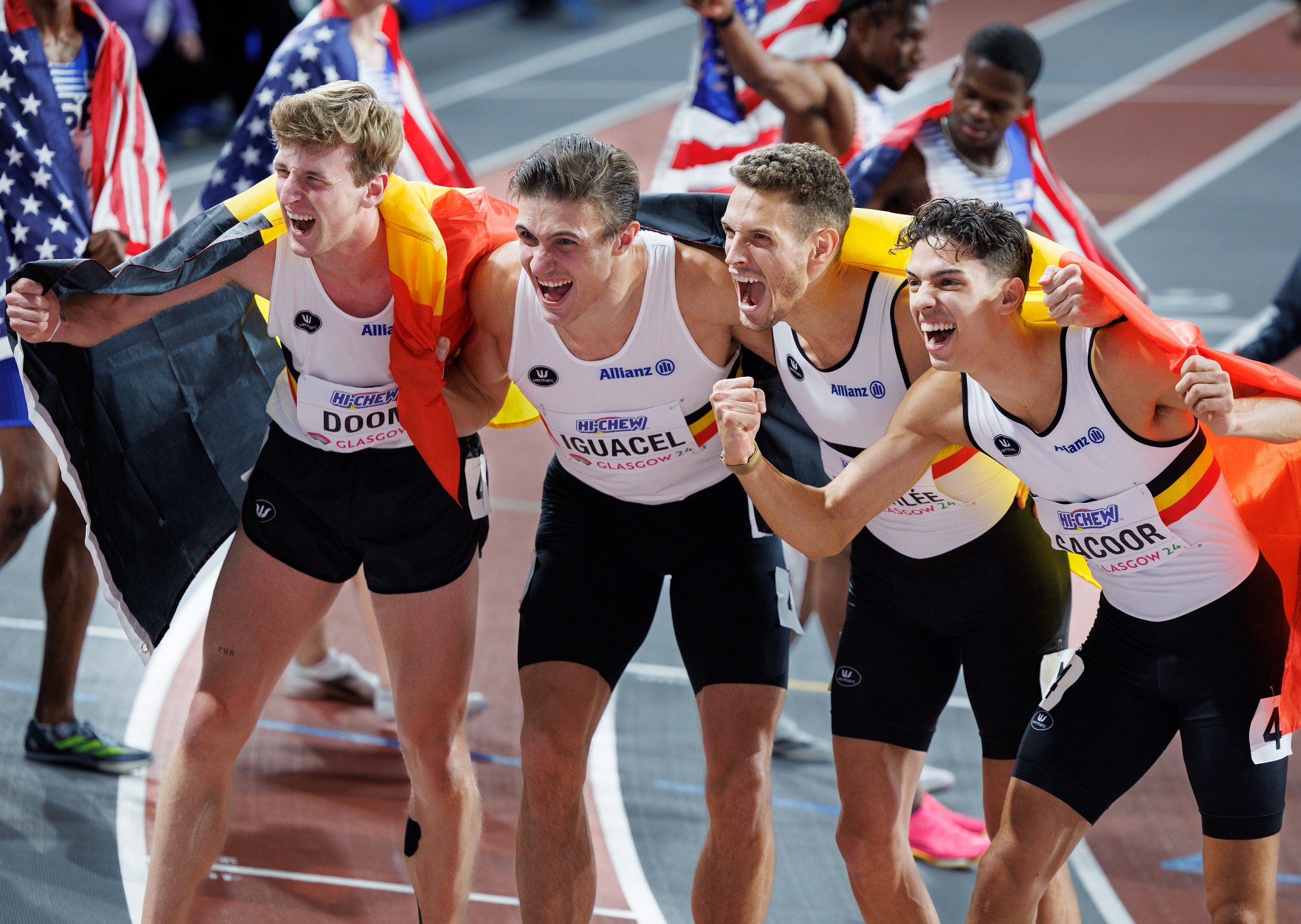Dylan Borlée saunters into Cook & Book, the sprawling café bookstore opposite the Woluwe Shopping Center, and just a short walk from the Stade Fallon running track where he usually trains. The svelte, handsome athlete is alone, which should not be unusual – but for the fact that he is typically associated with others.
A veteran of the Rio and Tokyo Olympics, Borlée is one of Belgium’s best medal hopes in Paris this summer, as part of the 4x400m relay team (by his own admission, the individual 400m title might be a step too far).
The 31-year-old is also the youngest member of the extraordinary Borlée family. Like his older siblings – Olivia and twins Jonathan and Kevin – Dylan has been on starting blocks and podiums at the world’s top running meets.
The Borlées are not merely a Belgian phenomenon, but a worldwide one. Olivia, 38, was part of the gold-medal-winning women’s 4x100 relay team at the 2008 Olympics in Beijing. Twins Kevin and Jonathan, both 36, have been part of relay teams winning countless world and European titles, as well as individual medals since 2010, most recently gold in the 2022 World Indoor Championships (Jonathan’s 44.43 for the 400m in 2012 is still the Belgian record). Their father, Jacques, 66, also their coach, ran for Belgium in the 1980 Olympics in Moscow.
This year, however, Dylan will be without his brothers. Eight years ago, at the 2016 Rio Olympics, Dylan, Jonathan and Kevin accounted for three-quarters of the Belgian relay team that came fourth. Now Dylan is the last runner standing, so to speak. Olivia retired long ago, and while Jonathan and Kevin still run, they no longer compete at the highest level.
Now on the verge of what he considers his strongest year, Dylan is honing his mental and physical preparation ahead of Paris. "The pressure is immense,” he says as he orders a ginger ale. “Everyone's talking about Paris, but for me, it’s about staying healthy and focused on the present. I take it one step at a time, concentrating on daily routines. A bit of pressure is good; it sharpens my focus."
Just behind him, a big book on Bob Dylan is on display, offering a pleasing ‘Dylan’ next to his head. He laughs at the coincidence. But he wasn’t named after the singer – Olivia, six when he was born, chose the name simply because she liked it.
But now he wants to talk about running. He has new relay partners – Alexander Doom, Jonathan Sacoor and Christian Iguacel – and the aim is to build the best team, whoever he passes the baton to.
"Creating a successful relay team is like assembling a puzzle," he says. "It's not about simply choosing the fastest runners. Each athlete brings a unique quality, whether it's experience, speed at specific points in the race, or the ability to handle the baton with precision. Decisions are often made at the last minute, factoring in tests, current form, and overall fitness."
There is, he says, a delicate balance of individual strengths and collective harmony. "Every athlete has to prove themself, especially when everyone is fit and ready. It's a competitive atmosphere, but it's rooted in mutual support and respect."
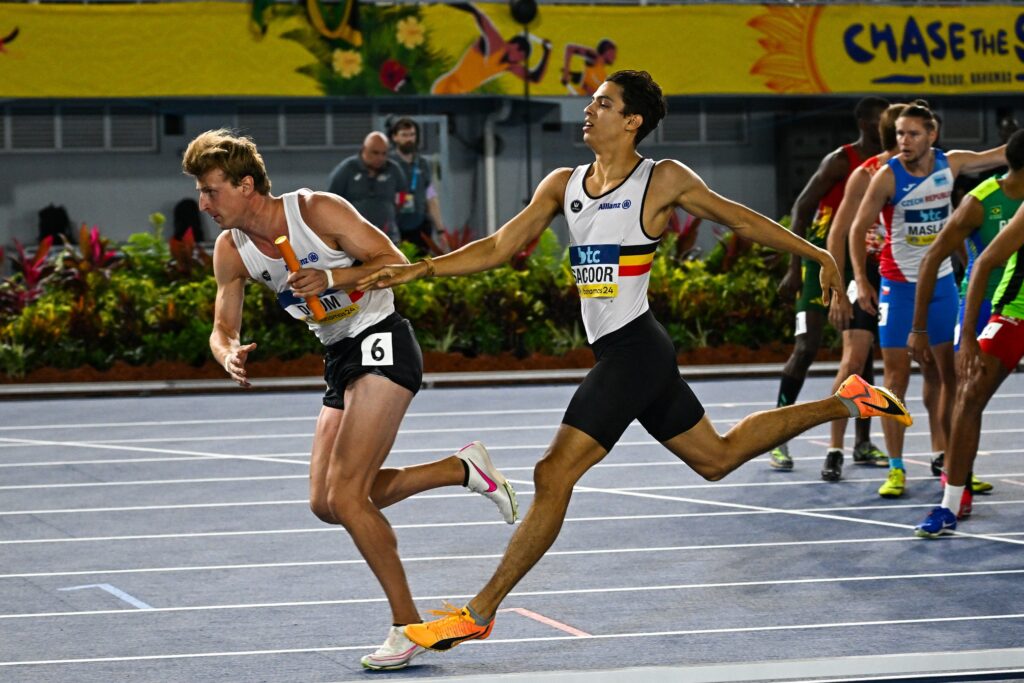
Alexander Doom and Jonathan Sacoor
Before getting carried away about his prospects, it is worth remembering Belgium has never even been on the podium for either the relay or the 400m individual events at the Olympics. However, they have come agonisingly close in the relay several times: fourth in Tokyo three years ago and Rio in 2016, fifth in London in 2012 and fourth again in Beijing in 2008. In the individual event, only in 2012 have any Borlées reached the final, with Kevin and Jonathan coming fifth and sixth respectively.
Mental fortitude, physical peak
Can the so-called Belgian Tornadoes finally catch relay giants like the United States, Britain and Jamaica?
Dylan wryly notes that they have already done so this year, winning the 4x400m relay at the World Indoor Championships in Glasgow in March. And he says they have an exceptional team spirit. “We want to fight for each other. We don't just think about ourselves we also think about the other guys,” he says. “For example, at the World Relays in the Bahamas, I hurt myself a little and my first thought was the guys in the team rather than thinking that my season might be over through injury. It's instinct that takes over and we think about the team.”
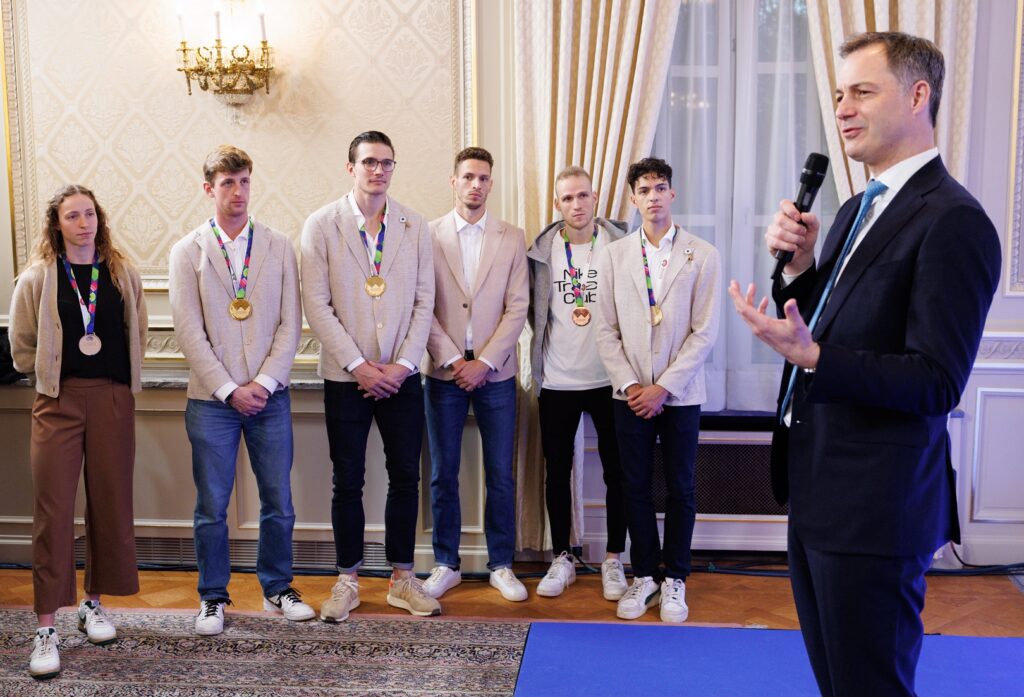
The Tornadoes are greeted by Prime Minister Alexander de Croo
Dylan is also hitting his best form, which is hardly a given during a runner’s career. “This is my strongest year in terms of training, it's going really well, so I'm really confident,” he says. “I had a very good season in 2023, beating my record – and it’s the first time in my career where I did it two years in a row. And I feel capable of beating my record again. But I have to stay focused,” he says, before breaking from French into English: “I don't take this for granted.”
Dylan fell into a slump after the Tokyo games in 2021, stagnating after years of steady improvement. “I couldn't move on to the next level. I couldn't find the key.”
He turned himself around mainly by rethinking his mental preparations. “I learned how to feel good about myself,” he says. “I run a lot with my emotions, with my feelings – I’m not a robot – and I used to find it hard to get in my zone. But now, I know myself a lot better. And I’ve found it is a lot more fun now.”
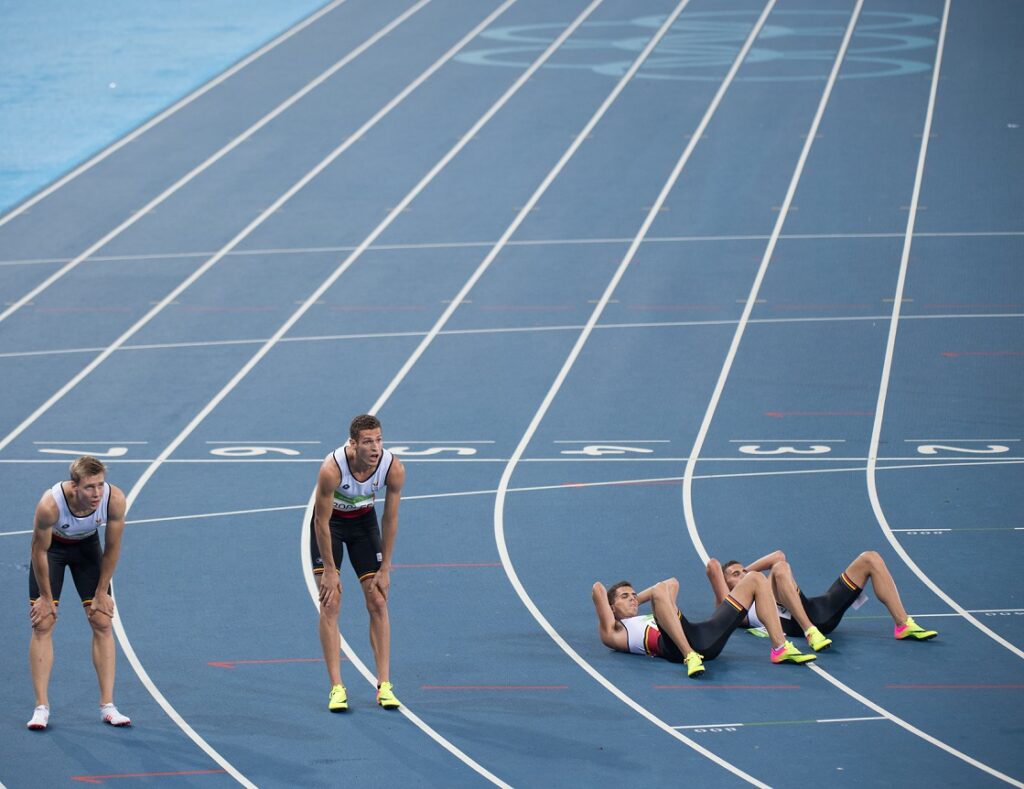
The Tornadoes fall short again, with a fourth place at the Tokyo 2020
He is also thinking about the long-term prospects for the Tornadoes, which, he emphasises, do not just involve the Borlées. “We need to sustain the momentum,” he says. "It’s not just about the present but about fostering a culture that thrives even as individual athletes come and go."
Brotherly bonds
It’s easy to assume that Jacques is the driving force behind the family’s running success, akin to Richard Williams zealously pushing his daughters Venus and Serena to become tennis champions. But Dylan credits Olivia, who was Belgium’s flagbearer at Rio 2016. Inspired by sprinter Kim Gevaert, Olivia started her own training regimen, bringing her father in later. In turn, Jonathan and Kevin also caught the bug. Only second sister, Alizia, 33, broke with the family tradition by not competing.
Dylan says running with his brothers was an unbeatable feeling. “It's difficult to even describe this sensation. It was calming being together because we trust each other so much and we know each other so well – it was like playing together in the garden,” he says. “If I don't win a medal with my brothers, it's not the same thing – I don't have the same emotion.”
He knows the window for running glory has been closing for his brothers, but there are still opportunities. “I really hope to be able to run again with them. Will it be possible? I don’t know, but I am so grateful and lucky to have done it because I really experienced emotions where I don't know if I'll be able to experience that again.”
Diet and discipline
Dylan’s training regimen is gruelling and meticulously planned. "In the base building phase, we train 20 to 30 hours a week, including physiotherapy and mobility exercises. As competitions approach, normally all the work must have been done and the focus shifts to quality over quantity,” he says.
Diet also plays a pivotal role. "Each athlete's needs are different and we shouldn’t just copy each other,” he says, before noting that he has to watch that he eats enough as he loses weight easily.
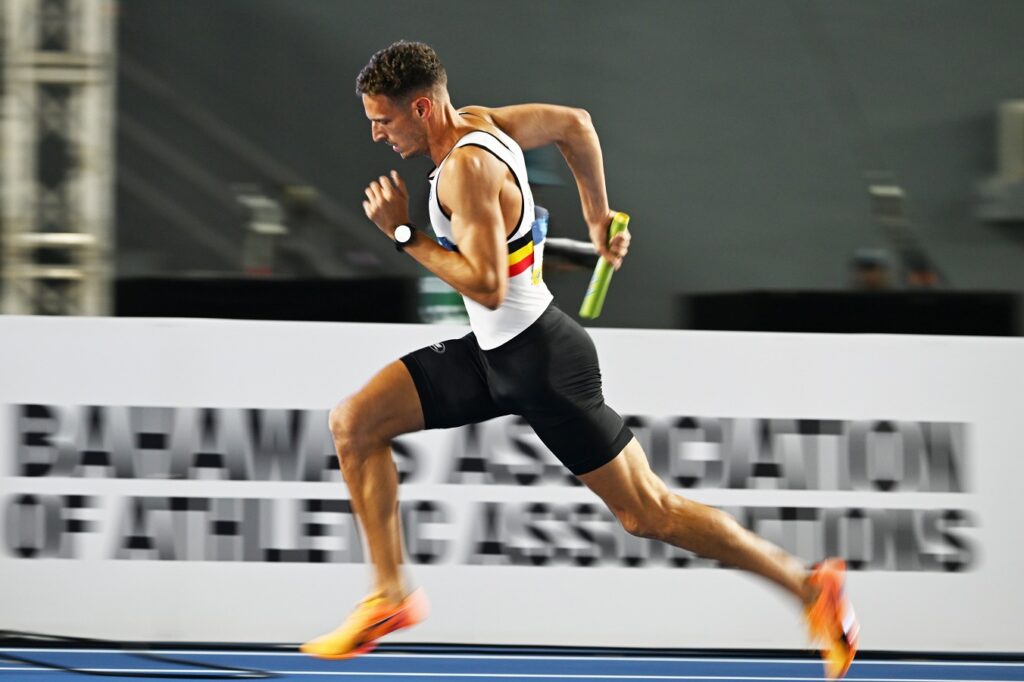
Dylan Borlée in full pelt
Snacks and fast food are avoided, as well as late-night meals, but the regime is not too strict. “Balance is key. It’s not just what your body needs but what your mind needs. So from time to time, I will have a glass of wine, which can help me to relax.”
He also needs distractions. That can include his cinema and music, but Dylan’s first choice is going out to dinner with his wife and friends. He also mentions playing video games – his current favourite is Apex Legends – and following other sports, like NBA basketball and English Premier League football (he’s an Arsenal fan).
Life after the Olympics
In a few weeks, he will be in one of the most intense sporting environments ever. What is the atmosphere in the Olympic Village like?
“Rio was the first time, so I felt it as a little kid,” he says. “We were closed off from the world in these large buildings where all the athletes are we all eat together in a huge refectory where you bump into superstars like Rafael Nadal.”
But Tokyo, delayed a year because of the Covid-19 pandemic, was overshadowed by health precautions. “In the refectory, there was Plexiglas between everyone, we had to do tests all the time, and there was no crowd in the stadium,” he said. “At the same time, I'm grateful for that because it made me realise that maybe I was putting a little too much pressure on myself.”
Now he’s hoping for something else. “Rio and Tokyo were two completely different experiences but I want Paris to be something else,” he says. “I definitely want to feel this fervour around sport in Paris, to really feel the enthusiasm.”
He also has to think about life after the games. September will be a fallow period when he doesn’t train at all. He says the month-long hiatus before the new season is essential for the body and soul – but after the mental and physical pause, he’ll come back freshly motivated.
He’ll still do sport during the break, but other disciplines – cycling, padel and football – although he has to be careful about injuries. The Borlées long avoided skiing for that reason but did so two years ago. “Sometimes, mentally, we have to find fun things to do and not focus only on athletics,” he says
After that, he has nuptials to think of. His civil marriage to Celine Vrancx, a biomedical researcher, was earlier this year but their wedding with friends and family will be in the autumn. “I have always had difficulty focusing on two big things at the same time, but fortunately my wife takes care of it much more than me,” he says. “What happens next is something to look forward to – it’s a bit scary but it is exciting too.”

